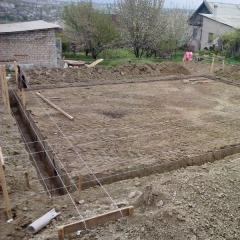How to get land ownership from the state for free?
Own land is a cherished dream for many of us. However, the high cost of the allotment is frightening, and this dream seems unrealizable. Not all potential landowners know that the state can transfer a plot to private ownership on a gratuitous basis. Thus, you can create your own cozy corner without significant cash costs.
In theory, this opportunity is available to everyone: any citizen can count on receiving a land plot in the region of permanent residence. This will require some knowledge of the legislation, in particular regarding the allocation of land resources.
 Dear Readers! Our articles talk about typical ways of solving legal issues, but each case is unique.
Dear Readers! Our articles talk about typical ways of solving legal issues, but each case is unique.
If you want to know how to solve exactly your problem - contact the online consultant form on the right. It's fast and free! Or call us on telephones:
+7 (499) 703-47-59
Moscow, Moscow region
+7 (812) 309-16-93
Saint Petersburg, Leningrad region
8 (800) 511-69-42
Federal number ( the call is free for all regions of Russia)!
Issues related to the transfer of land for personal use are dealt with by the territorial subjects of the Russian Federation represented by local administrations. Almost every region has specific regulations that guarantee the right to free land acquisition for families with more than two children.
If such a family decides to acquire a plot for the construction of housing, it will receive the ownership of a personal plot without any approvals and bidding procedures applied in all other cases. The only limitation is that only municipal or state-owned land can be transferred.
On land rights for homeowners
Any citizen who actually uses it can count on the free transfer of a plot of land to personal ownership. This provision is clearly spelled out in the Law No. 137-FZ (Art. 3, Part 4). Also, a condition for free transfer is the presence on the site of a residential building owned by a citizen.
It is assumed that the ownership of real estate has arisen:
- before the entry into force of the current version of the Land Code;
- or after the introduction of modern norms of the Land Code, while the property was inherited.
It should be noted that the landlord can apply for the transfer of the plot only if he inherited the immovable property located on this land, prior to the date of entry of the new Land Code.
Heroes of Labor
Free transfer of land plots is guaranteed to Heroes of Socialist Labor, persons awarded the Orders of Labor Glory, as well as Heroes of Labor of the Russian Federation. This is stated in the law No. 5-FZ, in force since January 9, 1997.
The land can be transferred to the specified persons if they intend to use it for the following purposes:
- for the construction of a summer house;
- housing construction;
- for the organization of an individual subsidiary farm;
- for gardening.
The area of the transferred plot within the city limits is at least 0.08 hectares, in rural areas - 0.25 hectares.
The rights of persons nominated for the awards "Hero of the Russian Federation" and "Hero of the Soviet Union"
All citizens awarded the highest state awards, including holders of the Order of Glory, can receive a land allotment from the state if its intended purpose belongs to one of the following categories:
- construction of housing or summer cottages;
- organization of subsidiary plots;
- gardening.
The area of the allotted allotment cannot be less than 0.2 hectares if it is located in a city, and 0.4 hectares if it is located in a rural area.
How to get ownership of land for free from the state
There are two common schemes for obtaining their own land plot, which are used by citizens of the Russian Federation. The simplest of them is the self-seizure of a plot of land and the construction of housing on it. When choosing a plot for self-capture, it is important to obtain information: whether it has an owner or a claimant to obtain ownership.
If during a certain time period no one has challenged your right to use the land, you can contact the local authorities to register the site as personal property. Depending on the region, this period can vary within 3-10 years.
The risk of this method is quite obvious: if the owner of the land turns up or you fail to draw up documents for the plot, the built house will be located on land that does not belong to you.
The second method is more reliable, although it will require compliance with a number of bureaucratic procedures. It consists in submitting an application to local authorities to conduct an auction for the site you are interested in.
To implement the scheme, you need to take several steps:
- The first step is to find a land plot that satisfies you with its characteristics. It is important that the land does not have its own cadastral passport, is not encumbered or processed by other persons. Information can be obtained from the land surveyor, who will issue a certificate confirming that the allotment is in state ownership, and there are no buildings on it. It is better to search for such sites far from large settlements and highways. Plots located in small settlements or part of horticultural associations are best suited;
- It is required to find out to which subject the selected allotment of land belongs: settlement, district or region. This information will be needed in order to correctly draw up an application. Subsequently, an application for the allocation of a plot of land must be submitted to this self-government body;
- Further, the local government will oblige you to make a cadastral passport for the site and all the necessary geodetic measures. Despite the fact that the costs in this case are borne by the applicant, they are incomparably less than the market value of a similar finished plot;
- Also, the applicant undertakes to post an ad in the local newspaper with information about the vacant land plot. The publication is intended to inform all potentially interested parties that an auction will take place in the near future, at which the land will be put up for sale. In most cases, no one will apply for the site, and you, as the only participant in the auction, will be able to buy it out very cheaply. But you should be prepared for the fact that the applicants will nevertheless appear, and the cost of the allotment after the auction will be much higher. Perhaps, in this case, it is worth taking a closer look at another site so as not to overpay extra money;
- After the auction, you will receive documents confirming the purchase of the allotment. They will be required to register the owner's rights in the local administration.
The auction layout may vary slightly from region to region. For example, in a number of regions, the only auction participant receives the right to buy out a plot only after he signs a lease agreement and receives a permit for housing construction. Differences in local legislation should be taken into account before you start looking for a site. Perhaps you can find an easier way to acquire land.
In theory, every citizen can claim free land from the state. However, in practice, in order to exercise their rights, certain categories of citizens are provided with a simpler procedure.
Among the population groups who have been provided with preferential conditions, the following categories of citizens can be distinguished:
- Families with three or more children, as well as families in whose care children with disabilities are;
- Residents who have rented an apartment in one locality for more than 5 years and need personal housing (for this you need to register with the local municipality);
- Citizens under 35 years of age, possessing a specialty required in rural areas, who have expressed their intention to permanently reside and work in the village, can receive a plot of the settlement in which they will work on the terms of an employment contract;
- Employed citizens who have lived in a village for more than five years can get land in the same village of a rural type;
- All persons who have reached retirement age and have lived in the village for more than five years can also receive an allotment at their place of residence;
- Rehabilitated persons previously subject to political repression;
- Relatives of the deceased combatant, WWII veteran, war invalid (disabled and previously dependent on him);
- Persons with the official status of a war veteran, participants in the blockade of Leningrad;
- All categories of contract servicemen.




